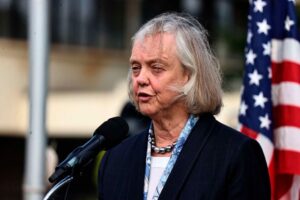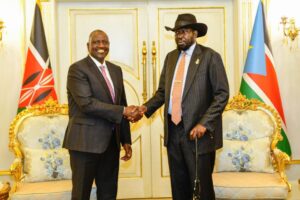Political and Regulatory Round-Up: Issue 46 of 2024

Kenya
Meg Whitman resigns as US ambassador to Kenya
 US Ambassador to Kenya Meg Whitman resigned on Wednesday, a week after Donald Trump’s return to the White House. Ms Whitman said she had tendered her resignation to outgoing US President Joe Biden. The Embassy will now be under the leadership of Chargé d’Affaires Marc Dillard.
US Ambassador to Kenya Meg Whitman resigned on Wednesday, a week after Donald Trump’s return to the White House. Ms Whitman said she had tendered her resignation to outgoing US President Joe Biden. The Embassy will now be under the leadership of Chargé d’Affaires Marc Dillard.
The former Wall Street chief executive had replaced Kyle McCarter, an appointee of Donald Trump’s first term who had quit earlier in 2021 after Joe Biden’s election as president. In a press statement, Ms Whitman highlighted her achievements in the position, citing the various trade, health, and security deals that Kenya signed with the US, such as elevating Kenya to the status of its first major non-NATO ally in sub-Saharan Africa.
(The Star)
Tanzania
Shock as Tanzania ruling party district leader fatally shot In Iringa
Christina Kibiki, the Secretary of Chama Cha Mapinduzi (CCM) for Kilolo District, was tragically shot dead by unidentified assailants in a late-night attack that has left the local community in shock. The violent incident occurred on Tuesday near Njiapanda ya Tosamaganga, a village in Iringa District Council, just outside Iringa town, where Kibiki resided. Witnesses reported that Kibiki was ambushed and shot between 4:30 PM and 5:00 PM.
(The Citizen)
Uganda
Legal system locking out the poor
The Equal Opportunities Commission (EOC) report ‘State of Equal Opportunities in Uganda FY 2023/2024’, released last week, indicates that several factors, such as long distances to courts and limited knowledge of legal processes, hinder Ugandans from accessing justice. Missing files were also mentioned where records are frequently misplaced or intentionally hidden, especially in land cases. There is also limited legal representation, language barrier, and people feeling uncertain about certain legal terms and processes. Absenteeism of judicial officers is also mentioned while obtaining bail is particularly challenging for individuals without political connections or financial resources, often leading to extended periods of detention.
The report identified other barriers to accessing justice, such as insufficient interpretation services in relevant local languages, exploitation of individuals due to illiteracy and poverty, intimidation during contract negotiations, threats to personal safety, lengthy case duration and challenges associated with older age, disability, location and gender.
Speaking at the report’s release in Kampala, the EOC chairperson, Ms Safia Nalule, appealed to the government to provide funding for legal aid services, particularly in rural areas. She added that the Judiciary should expedite the operationalisation of the magistrate courts, especially in districts that do not have any.
(Monitor)
Ethiopia
Leaders tie peace to ending hunger
Leaders who gathered in Addis Ababa, Ethiopia, on Thursday rallied a call, linking peace and security to ending chronic hunger in the region. They spoke at the World Without Hunger Conference, where they used the occasion to also call for collaboration in the use of new technology capable of producing food in the wake of erratic weather. Ethiopian Prime Minister Abiy Ahmed, Kenya’s President William Ruto, and several other leaders, including senior officials in the United Nations and the African Union, admitted that one challenge of seeking peace has been linked to effectively feeding the populations.
(The East African)
Rwanda
DRC, Rwanda in peace monitoring deal
Rwanda and the Democratic Republic of Congo (DRC) last week launched a joint monitoring mechanism in a bid to tame a vicious cycle of violence that continued even as both sides pledged to back a peace path.
The new platform, Mécanisme de Vérification Ad-hoc Renforcé (MVA-R), was launched on Tuesday in Goma in North Kivu. Officials say it will monitor compliance with the ceasefire between the two countries, but also between the M23 and the Congolese army (FARDC), following multiple violations of past agreements.
The mechanism also aims to establish a framework for direct dialogue between the two countries in an attempt to resolve the war that is tearing the eastern part of the DRC apart, in particular North Kivu and Ituri.
Fighting has broken the ceasefire for over two weeks, enabling the M23 to gain further ground in the Walikale territory of North Kivu. Rwanda and the DRC are expected to continue the Luanda peace process on November 16, when they hold their sixth ministerial meeting.
(The East African)
South Sudan
Kiir assures Ruto amid fear about tumaini initiative’s fate
 On Tuesday, Kenyan President William Ruto said he received a special message from President Salva Kiir through his envoy, allaying concerns over the South Sudan government’s failure to send its delegation to the resumption of peace talks in Nairobi.
On Tuesday, Kenyan President William Ruto said he received a special message from President Salva Kiir through his envoy, allaying concerns over the South Sudan government’s failure to send its delegation to the resumption of peace talks in Nairobi.
On November 11, the South Sudan Opposition Movement Alliance said the transitional government delegation did not turn up for the expected resumption of the negotiations – even after the two leaders agreed to finalise the peace process.
The process, known as the Tumaini Initiative, has stalled since mid-June after the SPLM-10 withdrew, citing some protocols and proposed institutions that are allegedly parallel or replacing some of those under the R-ARCSS. The main peace partner also said the Nairobi peace process undermined the sovereignty of South Sudan by establishing five institutions with the head and deputies to be appointed by the regional body, IGAD.
Lt. Gen. Lazarus Sumeiywo, the Chief Mediator of the Head of High-level Mediation for South Sudan, announced that parties may sign an agreement in two weeks, as directed by Kiir and Ruto when they met in Juba on November 6.
(Eye Radio)
Somalia
Jubaland leader presses ahead with election plans, defying Somalia’s govt
Jubaland regional state has pressed ahead with plans for an indirect election, defying fierce opposition from Somalia’s federal government. The region’s leader, Ahmed Madobe, however, remains unmoved by repeated appeals from Mogadishu, further deepening the rift between the two authorities.
Security in Kismayo, Jubaland’s interim capital, has been bolstered with the deployment of fresh troops around the airport and its environs. Somali Prime Minister Hamza Abdi Barre’s planned visit was abruptly cancelled after Jubaland authorities, who control the town’s only airfield, refused permission.
Madobe remains resolute in pursuing the indirect election process that secured him the presidency twice, where MPs chosen by a select group of elders elect the president. This method, which has previously allowed Madobe to win uncontested, is at odds with Somalia’s federal government, which is steadfast in rejecting anything but a one-person, one-vote election. Mogadishu is leaving no stone unturned in its efforts to derail his plans.
(Somali Guardian)

